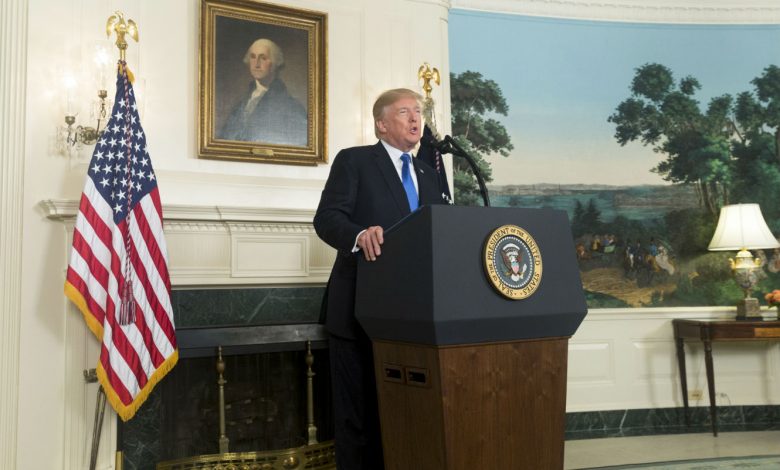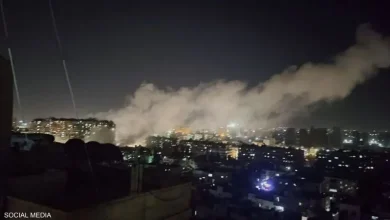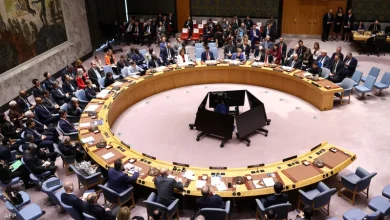
نشر موقع "وور اون ذي روكس"(war on the rocks) نص رسالة مفتوحة وجهها نحو مائة جنرال وسفير أميركي الى الرئيس دونالد ترامب ،يحذرون فيها من اندلاع حرب بين الولايات المتحدة وايران ،ومن الثمن الباهظ الذي قد تدفعه الولايات المتحدة جراء ذلك.
وقد تم تنسيق الرساله من قبل "مجموعة قادة الامن الوطني الاميركيه" (American College of National Security Leaders) ومقر هذه المجموعة في ولاية فرجينيا الاميركيه ومهمتها بحث آفاق الامن الوطني الاميركي .
وجاء في نص الرسالة:
السيد الرئيس العزيز
نكتب لك للتعبير عن عميق قلقنا من التصعيد الحالي مع ايران في الخليج العربي ، اذ ان العداء المتبادل بين ايران والولايات المتحده والإسراع الى إرسال حاملة طائرات مع مجموعتها القتاليه وقاذفات B 52 الى المنطقه ، الى جانب التقارير حول استعدادات ايرانيه لمهاجمة منشآت عسكريه ودبلوماسيه اميركيه ، لهي حقائق مقلقة جدا وتحمل مخاطر مواجهة عسكرية مميتة / قاتلة .
ان الحرب مع ايران ، سواء اختيارا ( اَي بقرار مسبق ) او عن طريق الخطأ ،سوف تؤدي الى ارتدادات دراماتيكية في الشرق الأوسط الذي يعاني أصلا من عدم الاستقرار . كما سيؤدي ذلك الى إقحام الولايات المتحده في نزاع مسلح يسفر عن ثمن مالي وانساني ( بشر او جنود ) وجيوسياسي هائل .
وكمهنيين ذوي خبرات كبيره في القوات المسلحه والسلم الدبلوماسي فقد كنا شهود عيان على كيفية خروج الخلافات عن السيطره . اذ ان عدم وجود تواصل مباشر ، بين القياده العسكريه والسياسيه الاميركيه من جهة والقياده الإيرانية من جهة اخرى ، وفي الوقت الذي يتم فيه تبادل الاتهامات بين الطرفين ، ان ذلك يزيد من احتمال وقوع اخطاء تؤدي الى مواجهة عسكرية غير مقصوده ، حيث لا يوجد فهم مشترك بين ايران والولايات المتحده وهما يتخذان اجراءات قد يراها او يفسرها الطرف الاخر انها اجراءات استفزازيه في احسن الأحوال او ان تؤدي الى ما هو اخطر في أسوأ الأحوال .
وقد أسعدتنا رغبتك في تفادي الحرب مع ايران لمصلحة أساليب اخرى دبلوماسيه . فبينما ادت العقوبات الاقتصاديه ضد ايران غرضها ، في تخفيض الدعم لحزب الله ، لكنها اثبتت ، والى حد بعيد ، عدم فعاليتها في تغيير سلوك النظام ، بينما اكدت على صحة مواقف المتشددين ( في ايران ) والقائلة بعدم وجود اية إمكانية لحل وسط مع الولايات المتحده .
ان لديك ، كرئيس وقائد اعلى ( للقوات المسلحه ) صلاحيات كبيره للقيام بتخفيض مستويات التوتر الخطيره في المنطقة فوراً . كما يجب اتخاذ اجراءات خفضٍ للتصعيد مع القياده الايرانيه وعلى اعلى مستوى حكومي وذلك كمقدمة لنشاط دبلوماسي يبحث عن المصالح المتبادله للطرفين . ان الحفاظ على مصالح الولايات المتحده ومصالح حلفائنا وأصدقائنا في الشرق الأوسط يتطلب تفكير رجل دولة عميق ودبلوماسية واقعية نشطه عوضا عن نزاع مسلح غير ضروري .
ملاحظة:يمكن الاطلاع على الرسالة في الموقع المذكور اعلاه وهي منشورة بتاريخ 24 أيار 2019
———————————————-
وهذا نص الرسالة وأسماء الجنرالات والسفراء باللغة الإنكليزية:
•
AN OPEN LETTER TO PRESIDENT DONALD TRUMP ON U.S. TENSIONS WITH IRAN
Dear Mr. President,
We write to you to express our deep concern with the current escalation with Iran in the Arabian Gulf. The mutual animosity between the United States and Iran, the accelerated deployment of an aircraft carrier strike group and B-52 bombers to the region, and reports of Iranian preparations for attacks on U.S. military and diplomatic facilities are highly concerning and make for a potentially deadly confrontation. A war with Iran, either by choice or miscalculation, would produce dramatic repercussions in an already destabilized Middle East and drag the United States into another armed conflict at immense financial, human, and geopolitical cost.
As national security professionals with extensive careers in the U.S. armed forces and diplomatic service, we have witnessed first-hand how quickly disputes can spiral out of control. The lack of direct communication between U.S. and Iranian political and military leaders during a time of heightened rhetoric only increases the possibility of a miscalculation resulting in unintended military conflict. Washington and Tehran are talking past each other and taking actions the other views as dangerously provocative at best and the beginning of forceful action at worst.
We were heartened by your reported desire to avoid war with Iran in favor of other tools, including common-sense diplomacy. While economic sanctions against Iran have had the beneficial effect of reducing financial support for Hezbollah in Lebanon, these, as well as military threats against Iran have thus far proved ineffective in changing the regime’s behavior and have likely reaffirmed the beliefs of Tehran’s hardline elements that compromise with the United States is impossible.
As President and Commander-in-Chief, you have considerable power at your disposal to immediately reduce the dangerous levels of regional tension. Crisis de-escalation measures should be established with the Iranian leadership at the senior levels of government as a prelude to exploratory diplomacy on matters of mutual concern. The protection of U.S. national interests in the Middle East and the safety of our friends and allies requires thoughtful statesmanship and aggressive diplomacy rather than unnecessary armed conflict.
Sincerely,
Rear Adm. Sandy Adams, U.S. Navy (ret.)
Brig. Gen. Clara Adams-Ender, U.S. Army (ret.)
Brig. Gen. Ricardo Aponte, U.S. Air Force (ret.)
Vice Adm. Donald Arthur, U.S. Navy (ret.)
Maj. Gen. Donna Barbisch, U.S. Army (ret.)¬
Brig. Gen. Roosevelt Barfield, U.S. Army (ret.)
Brig. Gen. Donald C. Bolduc, U.S. Army (ret.)
Brig. Gen. Stephen A. Cheney, U.S. Marine Corps (ret.)
Brig. Gen. Julia Cleckley, U.S. Army (ret.)
Ambassador Herman J. Cohen (ret.)
Rear Adm. Christopher Cole, U.S. Navy (ret.)
Maj. Gen. Peter Cooke, U.S. Army (ret.)
Vice Adm. Dirk Debbink, U.S. Navy (ret.)
Brig. Gen. James H. Doty Jr, U.S. Army (ret.)
Maj. Gen. Paul Eaton, U.S. Army (ret.)
Maj. Gen. Mari K Eder, U.S. Army (ret.)
Brig. Gen. Robert J. Felderman, U.S. Army (ret.)
Vice Adm. Michael Franken, U.S. Navy (ret.)
Lt. Gen. Walter Gaskin, U.S. Marine Corps (ret.)
Brig. Gen. Robert A. Glacel, U.S. Army (ret.)
Rear Adm. Stephen Glass, JAGC, U.S. Navy (ret.)
Vice Adm. Kevin P. Green, U.S. Navy (ret.)
Maj. Gen. Richard S. Haddad, U.S. Air Force (ret.)
Maj. Gen. Irv Halter, U.S. Air Force (ret.)
Rear Adm. Jan Hamby. U.S. Navy (ret.)
Maj. Gen. Bob Harding, U.S. Army (ret.)
Rear Adm. Charles Harr, MD, U.S. Navy (ret.)
Rear Adm. Len Hering, U.S. Navy (ret.)
Brig. Gen. Donald D. Harvel, U.S. Air Force (ret.)
Major General Sanford E. Holman, U.S. Army (ret.)
Ambassador Richard Holwill, (ret.)
Ambassador Vicki Huddleston, (ret.)
Ambassador Cameron Hume, (ret.)
Brig. Gen. David R. Irvine, U.S. Army (ret.)
Lt. Gen. Arlen D. Jameson, U.S. Air Force (ret.)
Ambassador Dennis Jett, (ret.)
Brig. Gen. John H. Johns, U.S. Army (ret.)
Ambassador Patrick Kennedy, (ret.)
Lt. Gen. Claudia Kennedy, U.S. Army (ret.)
Ambassador Jimmy Kolker, (ret.)
Maj. Gen. Dennis Laich, U.S. Army (ret.)
Maj. Gen. Steven J. Lepper, U.S. Air Force (ret.)
Brig. Gen. Phil Leventis, U.S. Army (ret.)
Maj. Gen. Donald Loranger, U.S. Air Force (ret.)
Maj. Gen. Randy Manner, U.S. Army (ret.)
Ambassador Edward Marks, (ret.)
Maj. Gen. Frederick H. Martin, U.S. Air Force (ret.)
Brig. Gen. Carlos E. Martinez, U.S. Air Force (ret.)
Mr. J. R. McBrien, Senior Executive Service, Treasury (ret.)
Lt. Gen. John W. Morgan III, U.S. Army (ret.)
Maj. Gen. David Morris, U.S. Army (ret.)
Adm. John Nathman, U.S. Navy (ret.)
Brig. Gen. J. Scott O’Meara, U.S. Marine Corps (ret.)
Rear Adm. David Oliver, U.S. Navy (ret.)
Maj. Gen. Eric T. Olson, U.S. Army (ret.)
Ambassador Richard G. Olson, (ret.)
Lt. Gen. Charles P. Otstott, U.S. Army (ret.)
Rear Adm. Glenn Phillips, U.S. Navy (ret.)
Maj. Gen. Jeffrey Phillips, U.S. Army (ret.)
Maj. Gen. John Phillips, U.S. Air Force (ret.)
Maj. Gen. Gale Pollock, U.S. Army (ret.)
Ambassador Charles Ray, (ret.)
Brig. Gen. Ronald Rokosz, U.S. Army (ret.)
Brig. Gen. John M. Schuster, U.S. Army (ret.)
Rear Adm. Joe Sestak, U.S. Navy (ret.)
Brig. Gen. Paul Smith, U.S. Army (ret.)
Rear Adm. Michael E. Smith, U.S. Navy (ret.)
Brig. Gen. Francis X. Taylor, U.S. Air Force (ret.)
Maj. Gen. F. Andrew Turley, U.S. Air Force (ret.)
Ambassador Edward Walker, (ret.)
Brig. Gen. George Walls, U.S. Marine Corps (ret.)
Brig. Gen. John Watkins, U.S. Army (ret.)
Lt. Gen. Willie Williams, U.S. Marine Corps (ret.)
Brig. Gen. Dan Woodward, U.S. Air Force (ret.)
Brig. Gen. Stephen N. Xenakis, U.S. Army (ret.)
Maj. Gen. David T. Zabecki, U.S. Army (ret.)





